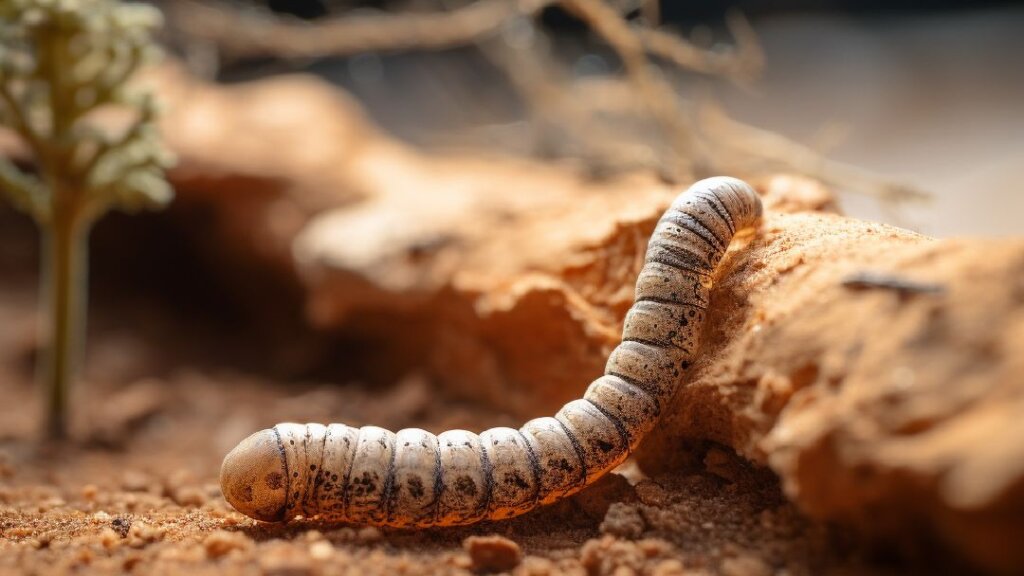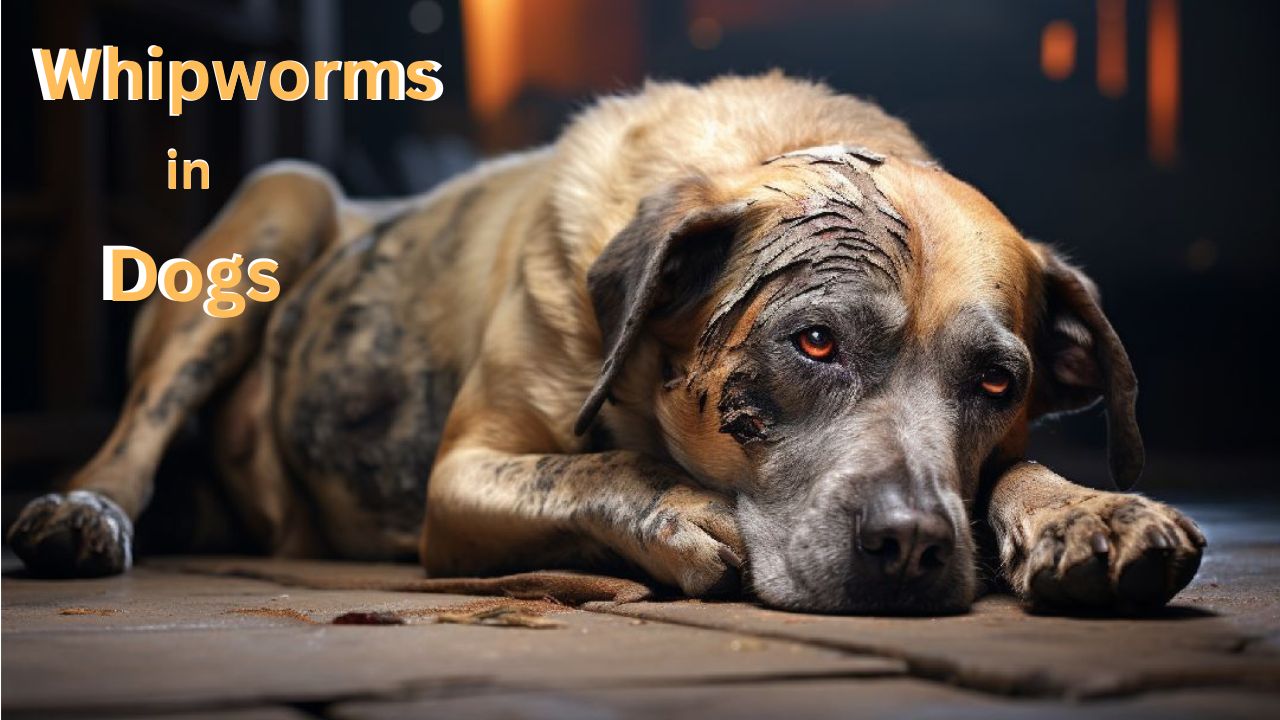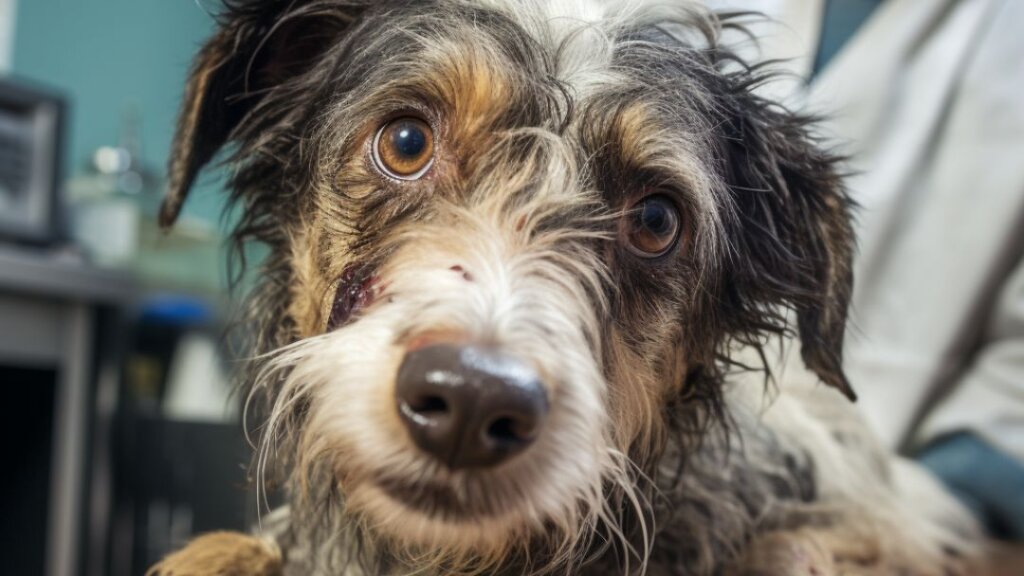Whipworms in dogs pose a silent threat to our beloved companions, often eluding early detection. These intestinal parasites, scientifically known as Trichuris vulpis, can wreak havoc on a dog’s health if left unchecked.
Read on as we unravel whipworms’ mysteries, shedding light on their lifecycle, symptoms, treatment, and preventive measures.
What are Whipworms?
Whipworms are parasitic nematodes that target the cecum and colon of dogs, causing various health issues.
Whipworms are thin, thread-like creatures, resembling whips at one end; they latch onto the intestinal lining, leading to inflammation and potential complications.
Dog Whipworm Life Cycle
The lifecycle of dog whipworms is a fascinating journey through different stages. Eggs shed in the environment mature into infective larvae, waiting to be ingested by an unsuspecting host.
Once inside the dog’s digestive system, the larvae develop into adult whipworms, perpetuating the cycle by shedding eggs in the feces.

What Causes Whipworms in Dogs?
Whipworm infections in dogs stem from ingesting whipworm eggs, typically found in contaminated soil or feces.
Dogs can pick up eggs through various means, such as grooming, sniffing, or playing in infected areas. Once ingested, the eggs hatch into larvae within the digestive tract, initiating the parasitic cycle.
5 Symptoms of Whipworm Infection
Whipworm infections in dogs can often go unnoticed until they escalate. Here are five symptoms to watch out for:
- Chronic Diarrhea: One of the hallmark signs is persistent diarrhea, often containing mucus or blood.
- Weight Loss: Whipworms can cause weight loss due to the nutrient absorption issues associated with the infection.
- Dehydration: Diarrhea can lead to dehydration, impacting your dog’s overall well-being.
- Lethargy: An infected dog may lack energy and enthusiasm, signaling an underlying health concern.
- Rectal Prolapse: In severe cases, whipworm infections may lead to rectal Prolapse, a more alarming symptom requiring immediate attention.
Treatment for Whipworms
Once whipworm infection is identified, prompt and effective treatment is essential. Here are some standard treatment options:
- Anthelmintic Medications: Prescription medications such as fenbendazole and milbemycin oxime are commonly used to eliminate whipworms.
- Regular Veterinary Check-ups: Regular visits to the vet can help catch and treat whipworm infections early.
- Follow-up Testing: After treatment, following up with diagnostic tests is crucial to ensure the complete eradication of whipworms.
- Hydration Support: Proper hydration support is vital for dogs dealing with dehydration due to diarrhea.
- Balanced Nutrition: A well-balanced diet helps strengthen the dog’s immune system, aiding in recovery.
5 Ways Of Preventing Whipworm Infestations
Prevention is vital when it comes to whipworms. Here are five proactive measures to keep your canine companion safe:
- Regular Vet Visits: Scheduled veterinary check-ups can help detect and address any potential whipworm threat early.
- Clean Living Environment: Maintain a clean living space for your dog, regularly cleaning and disinfecting areas where they spend time.
- Hygienic Practices: Practice good hygiene, including proper waste disposal and handwashing, to minimize the risk of exposure.
- Monitor Outdoor Activities: Be mindful of your dog’s outdoor activities, especially in areas where other dogs may frequent.
- Regular Deworming: Follow a deworming schedule your veterinarian recommends to prevent whipworm and other parasitic infections.
Zoonotic Transmission of Whipworms
While whipworms are primarily a concern for dogs, there is a potential risk of zoonotic transmission to humans. Here’s what you need to know:
- Limited Zoonotic Risk
The risk of humans contracting whipworms from dogs is relatively low but not nonexistent.
- Hand Hygiene
Hand hygiene after handling dogs or their waste can further reduce the risk.
- Avoiding Contaminated Areas
Be cautious in areas where dogs may have defecated, and encourage children to avoid playing in such spaces.
- Prompt Medical Attention
If you suspect a zoonotic transmission, seek prompt medical attention for a thorough evaluation and appropriate treatment.
Conclusion
By staying informed, you can create a shield against whipworms, the silent invaders, fostering a bond with our dogs grounded in a commitment to their enduring health. Stay aware and proactive, and let your dog friend thrive in a whipworm-free world.

FAQs
How long does whipworm last in dogs?
Whipworm infections in dogs can persist for weeks to months if left untreated. Timely and proper treatment is crucial for complete eradication.
What kills whipworms in dogs?
Prescription anthelmintic medications like fenbendazole and milbemycin oxime effectively kill dog whipworms.
Where do dogs pick up whipworms?
Dogs often pick up whipworms from contaminated environments, such as soil or feces. Avoid exposure to these areas and practice good hygiene.
Are there natural remedies for treating whipworms in dogs?
While some natural remedies may help, prescription medications remain the most effective treatment for whipworms.
Can whipworms in dogs affect humans?
The risk of zoonotic transmission from dogs to humans is low, but practicing good hygiene, especially hand washing after handling dogs or their waste, further minimizes this risk.







thank you, this saved my dog!
My sweet pup had whipworms last year. It was a nightmare figuring out what was wrong. Awareness is crucial. Keep spreading knowledge!